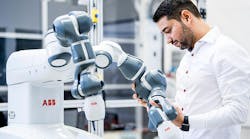Despite the widespread fear, and more than enough reports, proclaiming that robots will be taking over the factory floor, it seems that time has not yet come.
Humans still perform 72% of manufacturing tasks according to new data released today by A.T. Kearney and Drishti.
“Machines don’t innovate anything,” said Doug Neely, director of advanced monozukuri research at Yazaki North America, in the report. “Our people are the source of all of our competitiveness. There isn’t a machine out there that we could buy that would make us more competitive.”
The report gives its assessment of the human factor. "Humans are and will remain integral to the manufacturing process. Not just because robots require significant capital, skilled resources, long installation periods, and attendant programmers and engineers, but because of the fundamental qualities that make us human. We can logically reason. We can adapt. We are dexterous beyond anything robots are capable of today. And as manufacturers increasingly strive for lot sizes of one to satisfy customer demands for personalization and customization, these qualities are more valued than ever before."
However, the survey also revealed the flip side of human contributions to manufacturing systems: Survey respondents noted that 73% of variability on the factory floor stems from humans, and 68% of defects are caused by human activities.
While manufacturing technology has seen increasing innovation for decades, the standard practices for gathering and analyzing tasks done by humans – and the foundation of holistic manufacturing practices like lean and Six Sigma – are time-and-motion study methodologies, which can be directly traced back to the time of Henry Ford and have not been updated for the digital age, the report notes. .
"The principles underlying these 100-year-old measurement techniques are still valid, but they are too manual to scale, return incomplete datasets and are subject to observation biases," said Prasad Akella, CEO of Drishti. "In the age of Industry 4.0, manufacturers need larger and more complete datasets from human activities to help empower operators to contribute value to their fullest potential. This data will benefit everyone in the assembly ecosystem: plant managers, supervisors, engineers and, most importantly, the operators themselves."
The survey found that there is an almost universal lack of data into the activities that people perform in the factory. This analytical gap severely limits manufacturers' ability to make informed decisions on capacity planning, workforce management, process engineering and many other strategic domains. And it suggests that manufacturers may overprioritize automation due to an inability to quantify investments in the human work" force that would result in greater efficiencies. Perhaps, as a result, 39% of engineering time is spent on root cause investigations to trace defects – another manual expenditure of time that could be greatly reduced with better data.



